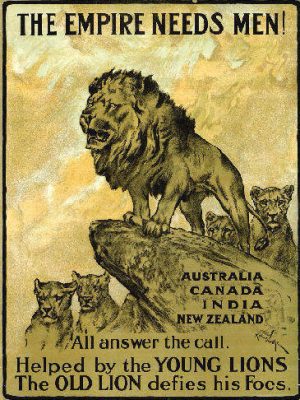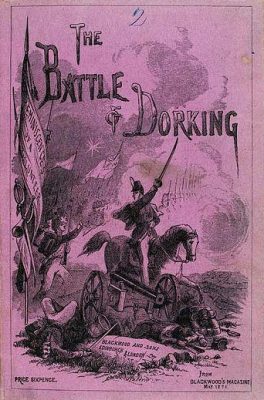Militarism Who Lead Germany During the Late 1800s Lost Power Then Led Again During Ww1

Nationalism was a prominent force in early 20th century Europe and a significant crusade of Earth War I. Nationalism is an intense form of patriotism or loyalty to one'due south land. Nationalists exaggerate the importance or virtues of their home country, placing its interests above those of other nations.
Feelings of supremacy
In the 19th and early 20th centuries, many Europeans, peculiarly citizens of the so-called Keen Powers (Britain, France and Germany) had convinced themselves of the cultural, economic and military supremacy of their nation. Co-ordinate to historian Lawrence Rosenthal, this sentiment was:
"…a new and aggressive nationalism, different from its predecessors, [that] engaged the fierce us-them grouping emotions – loyalty inwards, aggression outwards – that characterise human relations at simpler sociological levels, similar the family or the tribe."
The effects of this growing nationalism were an inflated confidence in ane's nation, its government, economy and military power. Many nationalists also became blind to the faults of their own nation. In matters of strange affairs or global competition, they were convinced that their state was fair, righteous and beyond mistake.
In contrast, nationalists criticised rival nations to the point of demonisation, caricaturing them every bit ambitious, scheming, mendacious, astern or uncivilised. Nationalist press reports convinced many readers the interests of their country were being threatened by the plotting, scheming and hungry imperialism of its rivals.
Sources of nationalism
The origins of this intense European nationalism are a matter of contend. Nationalism is likely a product of Europe'southward complex modern history. The rising of popular sovereignty (the interest of people in regime), the formation of empires and periods of economic growth and social transformation all contributed to nationalist sentiments.
Some historians suggest that nationalism was encouraged and harnessed by European elites to encourage loyalty and compliance. Others believe that nationalism was a by-product of economic and imperial expansion. Growth and prosperity were interpreted past some equally a sign of destiny. Other nations and empires, in contrast, were dismissed equally inferiors or rivals.
Politicians, diplomats and royals contributed to this nationalism in their speeches and rhetoric. Nationalist sentiment was also prevalent in press reporting and popular culture. The pages of many newspapers were filled with nationalist rhetoric and provocative stories, such every bit rumours about rival nations and their evil intentions. Nationalist ideas could besides exist found in literature, music, theatre and art.
In each country, nationalism was underpinned past different attitudes, themes and events. Nationalist sentiment was fuelled past a sense of historical destiny and, therefore, closely tied to the history and development of each nation.
Military machine over-confidence
Nationalism was closely linked to militarism. It fostered delusions about the relative war machine strength of European nations. Many living in the Peachy Powers considered their nations to exist militarily superior and better equipped to win a futurity state of war in Europe.
The British, for example, believed their naval power, coupled with the size and resources of the British Empire, would give them the upper paw in any war. Beingness an isle also isolated Britain from invasion or strange threat.
German leaders, in contrast, placed swell faith in Prussian military efficiency, the nation's powerful industrial base, her new armaments and her expanding fleet of battleships and U-boats (submarines). If state of war erupted, the German high control had neat confidence in the Schlieffen Plan, a preemptive military strategy for defeating France before Russian federation could mobilise to back up her.
In Russia, Tsar Nicholas II believed his empire was sustained by God and protected by a massive continuing army of ane.v million men, the largest peacetime country strength in Europe. Russian commanders believed the land'southward enormous population gave it the whip mitt over the smaller nations of western Europe.
The French placed their faith in the country'southward heavy industry, which had expanded rapidly in the late 1800s. Paris also played smashing stock in its defences, particularly a wall of concrete barriers and fortresses running the length of its eastern edge.
Attitudes to war
Nationalist and militarist rhetoric assured Europeans that if war did erupt, their nation would emerge as the victor. Along with its unsafe brothers, imperialism and militarism, nationalism fuelled a continental mirage that contributed to the growing mood for war.
Past 1914, Europeans had grown apathetic and dismissive about the dangers of state of war. This was understandable. Aside from the Crimean State of war (1853-56) and the Franco-Prussian War (1870-71), the 1800s was a century of comparative peace in Europe. With the exception of French republic, defeated by the Prussians in 1871, the Not bad Powers had not experienced a significant military machine defeat for more than one-half a century.
For nearly Europeans, the experiences of war were distant and vague. The British and French had fought colonial wars in Africa and Asia just they were cursory conflicts against disorganised and underdeveloped opponents in faraway places. Militarism and nationalism revived the prospects of a European war, also as naivety and overconfidence about its likely outcomes.
'Invasion literature'

By the late 1800s, some Europeans were nigh drunk with nationalist sentiment. In some respects, this was a product of overconfidence fuelled by decades of relative peace and prosperity.
Britain, for case, had enjoyed two centuries of purple, commercial and naval authorisation. The British Empire spanned one-quarter of the earth and the lyrics of a popular patriotic song, Dominion, Britannia!, trumpeted that "Britons never, never volition be slaves". London had spent the 19th century advancing her regal and commercial interests and avoiding wars. The unification of Germany, the speed of High german armament and the bellicosity of Kaiser Wilhelm 2, still, acquired concern among British nationalists.
England's 'penny printing' (a commonage term for cheap, serialised novels) intensified nationalist rivalry by publishing incredible fictions most foreign intrigues, espionage, future state of war and invasion. The Battle of Dorking (1871), one of the best-known examples of 'invasion literature', was a wild tale about the occupation of England by German forces. By 1910, a Londoner could purchase dozens of tawdry novellas alarm of High german, Russian or French aggression.
Invasion literature often employed racial stereotypes or allusion. The German was depicted as common cold, emotionless and calculating; the Russian was an uncultured barbarian, given to wanton violence; the Frenchman was a leisure-seeking layabout; the Chinese were a race of murderous, opium-smoking savages.
Penny novelists, cartoonists and satirists besides mocked foreign rulers. The German Kaiser and the Russian Tsar, both frequent targets, were ridiculed for their arrogance, ambition or megalomania.
German nationalism
Attitudes and overconfidence in Germany was no less intense. German nationalism and xenophobia, however, had different origins to those in Britain.
Unlike Britain, Germany was a insufficiently young nation, formed in 1871 after the unification of 26 German-speaking states and territories. The belief that all High german-speaking peoples should be united in a single empire, or 'Pan-Germanism', was the political glue that leap these states together.
The leaders of post-1871 Germany employed nationalist sentiment to consolidate the new nation and gain public back up. High german culture – from the poetry of Goethe to the music of Richard Wagner – was promoted and historic.
High german nationalism was also bolstered by German militarism. The strength of the nation, German leaders believed, was reflected by the forcefulness of its armed forces forces.
The nationalist Kaiser
The new Kaiser, Wilhelm 2, became the personification of this new, nationalistic Germany. Both the Kaiser and his nation were immature and aggressive, obsessed with armed forces power and imperial expansion, proud of Deutschland's achievements but envious of other empires.
To Wilhelm and other German nationalists, the chief obstacle to German expansion was Britain. The Kaiser envied U.k.'s vast empire, commercial enterprise and naval power – but he thought the British avaricious and hypocritical. London oversaw the world'south largest empire yet manoeuvred against German colonial expansion in Africa and Asia.
As a outcome, Britain became a popular target in the pre-state of war German press. Britain was painted equally expansionist, selfish, greedy and obsessed with money. Anti-British sentiment intensified during the Boer War of 1899-1902, U.k.'southward state of war against farmer-settlers for control of S Africa. Ernst Lissauer's 1914 'Hassgesang gegan England' ('Song of Hate for England') is one of the best-known examples of anti-English sentiment.
Independence movements

Every bit the Cracking Powers of Europe vanquish their chests, another course of nationalism was on the ascent in southern and eastern Europe. This nationalism was non about supremacy or empire but the right of ethnic groups to independence, autonomy and cocky-government.
With the world divided into big empires and spheres of influence, many regions, races and religious groups sought freedom from their imperial masters. In Russia, more than 80 ethnic groups in eastern Europe and Asia had been forced to speak the Russian language, worship the Russian tsar and practice the Russian Orthodox religion.
For much of the 19th century, China had been 'carved up' and economically exploited past European powers. The failed Boxer Rebellion of 1899-1900 was an effort to expel foreigners from parts of China. Later, resentful Chinese nationalists formed underground groups to wrest back command of their country.
Nationalist groups contributed to the weakening of the Ottoman Empire in eastern Europe past seeking to throw off Muslim dominion.
Balkan nationalism
None of these nationalist movements contributed more directly to the outbreak of war than Slavic groups in the Balkans. Pan-Slavism, a conventionalities that the Slavic peoples of eastern Europe should have their ain nation, was a powerful force in the region. Slavic nationalism was strongest in Serbia, where information technology had risen significantly in the belatedly 19th and early 20th centuries.
Pan-Slavism was particularly opposed to the Austria-hungary and its command and influence over the region. Aggravated by Vienna's annexation of Republic of bosnia and herzegovina, many young Serbs joined radical nationalist groups like the 'Black Mitt' (Crna Ruka).
These groups hoped to drive Austro-hungarian empire from the Balkans and establish a 'Greater Serbia', a unified state for all Slavic people. It was this pan-Slavic nationalism that inspired the assassination of Archduke Franz Ferdinand in Sarajevo in June 1914, an outcome that led straight to the outbreak of Earth War I.

1. Nationalism was an intense class of patriotism. Those with nationalist tendencies celebrated the civilisation and achievements of their own land and placed its interests in a higher place those of other nations.
ii. Pre-war nationalism was fuelled past wars, imperial conquests and rivalry, political rhetoric, newspapers and popular culture, such as 'invasion literature' written by penny press novelists.
three. British nationalism was fuelled by a century of comparative peace and prosperity. The British Empire had flourished and expanded, its naval forcefulness had grown and Britons had known simply colonial wars.
iv. German nationalism was a new phenomenon, emerging from the unification of Deutschland in 1871. It became fascinated with German royal expansion (securing Germany'due south 'identify in the dominicus') and resentful of the British and their empire.
five. Rising nationalism was likewise a cistron in the Balkans, where Slavic Serbs and others sought independence and autonomy from the political domination of Austria-Hungary.
Title: "Nationalism as a cause of World War I"
Authors: Jennifer Llewellyn, Steve Thompson
Publisher: Blastoff History
URL: https://alphahistory.com/worldwar1/nationalism/
Engagement published: September 7, 2020
Date accessed: May 06, 2022
Copyright: The content on this folio may not be republished without our express permission. For more information on usage, please refer to our Terms of Apply.
petersthrainater1946.blogspot.com
Source: https://alphahistory.com/worldwar1/nationalism/#:~:text=The%20new%20Kaiser%2C%20Wilhelm%20II,but%20envious%20of%20other%20empires.
0 Response to "Militarism Who Lead Germany During the Late 1800s Lost Power Then Led Again During Ww1"
Post a Comment